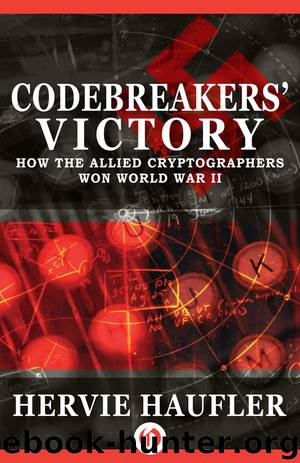Codebreakers Victory by Hervie Haufler

Author:Hervie Haufler
Language: eng
Format: epub
Publisher: Open Road Media
Published: 2002-12-31T16:00:00+00:00
Winning at Moscow, Stalingrad and Kursk
When, despite warnings, the Russian armies had been surprised and shattered during the opening phases of the war, Moscow's intelligence cadres could do little to stem the devastating series of Nazi conquests. Yet the information they supplied soon began to have consequences. As the Germans prepared to resume their assault on Moscow, Bletchley Park succeeded in breaking a new eastern-front Enigma cipher, whose messages revealed in detail the German order of battle. Reading these decrypts, Churchill asked Stewart Menzies, his chief of intelligence, "Are you warning the Russians of these developing concentrations?" When Menzies affirmed this was being done, Churchill nevertheless added, "Show me the last five messages you have sent."
A more vital contribution to the defense of Moscow came from Sorge. A big question hanging over the Soviets was whether Japan, as the third main partner in the Axis, would enter the war against Russia. The likelihood seemed good, given the long history of rancor between the two. To guard against this eventuality, the Soviets had to keep many divisions in the Far East. Now Sorge presented convincing evidence that an attack on Russia did not fit into the plans of the Japanese; their intentions were directed southward toward the English, Dutch and Americans.
From Switzerland, the Red Three confirmed Sorge's information. San-dor Rado quoted the Japanese ambassador in Bern as saying, "There can be no possible question of a Japanese attack against the Soviet Union until Germany wins a decisive victory on the Eastern Front"—i.e., until Moscow falls.
By then, Stalin and his generals had enough confidence in their informants to rush eighteen divisions, half of the Eastern command, by rail to Moscow, with additional divisions drawn from Siberia and Outer Mongolia. Richard Overy, in his excellent history Russia's War, described how, suddenly in the days just before Stalin and his commander in chief, Marshal Georgi Zhukov, were planning their December 5 counteroffensive, the streets of Moscow were filled with "tough, fresh-faced 'Siberian boys,'" to whom bitter cold seemed a natural element. The arrival of divisions from the East added a powerful cutting edge to the new divisions Zhukov was skillfully organizing and training. Overy commented, "It was not the tough winter conditions that halted the German army but the remarkable revival of Soviet military manpower after the terrible maulings of the summer and autumn."
To have masses of fresh Russian troops coming at them in subzero weather surprised and shocked the Germans. Their own initiative was stalled. Instead of occupying the buildings of Moscow, the German soldiers were forced to endure the ravages of the Russian winter in open country. Many of them wore only summer uniforms. To equip the troops for winter war had been considered a defeatist attitude—the Russian edifice was supposed to have collapsed well before winter set in. The German army would be debilitated by more than 133,000 cases of frostbite.
Not only was the German advance stopped. The Russian counteroffensive harried the Germans into a retreat that almost ended in a rout.
Download
This site does not store any files on its server. We only index and link to content provided by other sites. Please contact the content providers to delete copyright contents if any and email us, we'll remove relevant links or contents immediately.
Effective Threat Investigation for SOC Analysts by Yahia Mostafa;(7483)
Practical Memory Forensics by Svetlana Ostrovskaya & Oleg Skulkin(7204)
Machine Learning Security Principles by John Paul Mueller(7158)
Attacking and Exploiting Modern Web Applications by Simone Onofri & Donato Onofri(6830)
Operationalizing Threat Intelligence by Kyle Wilhoit & Joseph Opacki(6795)
Solidity Programming Essentials by Ritesh Modi(4584)
Microsoft 365 Security, Compliance, and Identity Administration by Peter Rising(4179)
Operationalizing Threat Intelligence by Joseph Opacki Kyle Wilhoit(3927)
Learn Computer Forensics - Second Edition by William Oettinger(3677)
Building a Next-Gen SOC with IBM QRadar: Accelerate your security operations and detect cyber threats effectively by Ashish M Kothekar(3664)
Future Crimes by Marc Goodman(3592)
Blockchain Basics by Daniel Drescher(3574)
Mastering Azure Security by Mustafa Toroman and Tom Janetscheck(3541)
Mastering Python for Networking and Security by José Manuel Ortega(3493)
Incident Response with Threat Intelligence by Roberto Martínez(3408)
The Code Book by Simon Singh(3177)
Mastering Bitcoin: Programming the Open Blockchain by Andreas M. Antonopoulos(3035)
Mobile App Reverse Engineering by Abhinav Mishra(2998)
From CIA to APT: An Introduction to Cyber Security by Edward G. Amoroso & Matthew E. Amoroso(2905)
